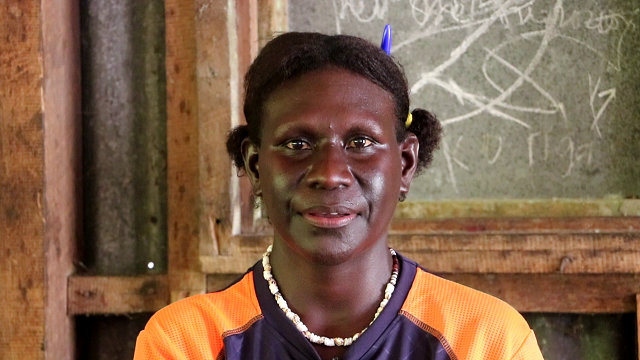Negative gender norms can be changed: Hilda
“When I started my education, I wanted to be equal with men”, says Hilda.
She is a certified welder, a field she says is dominated by men in Papua New Guinea but that does not mean women cannot become whatever men aspire to be.
“It’s not only the men who can do these kinds of work but us women too”, she adds.
Hilda shared her views after attending a Gender Equality and Social Inclusion (GESI) Training conducted by project staff under the Building Economic and Health Resilience Project (BERHP) in Konga, Siwai – South Bougainville.
She is the chair lady of a Savings for Transformation (S4T) group in her community, the Zion Women’s S4T group in Konga, Siwai District.

Siwai is a target location for BERH Project. The project works with communities in five target districts in Central and South Bougainville to improve their livelihoods through various components of the project.
Implemented by World Vision in PNG with funding support from the Government of New Zealand, the project aims to increase knowledge on Financial Literacy, Child Nutrition and encouraging people to venture into small to medium business enterprises through their savings group savings.
More emphasis is placed on the S4T component of the project because it has been found that an estimated 200, 000 people in Bougainville of the estimated total population of 300, 000 still lack access to financial services.
It is understood that, a household will have the ability to improve its livelihood if it is financially empowered hence improving the lives of the children in that household or family.
Other additional components of the project such as Nutrition, Market and GESI are introduced to provide pathways that these target communities can use to sustain their savings, supplement and improve the preparation of healthy, nutritious meals in their families.
The GESI component comes along to educate men and women in these communities to better understand their roles and how they can support each other in their homes, as well as counter any negative gender issues that may arise in the family hence benefitting the most important group, the children.
“I’ve seen that this training is helping a lot of women in our S4T group”, says Hilda.
Over time, she has noticed that women are becoming more open and are now sharing their experiences to help others who have gone through the same issues in intimate relationships and their families.
“Women are beginning to understand that both men are women must be equal partners and support each other in the home”, she adds.
She says that existing knowledge around gender roles have come from society and were introduced so these gender norms can be changed.
“Most of these women and their husbands have never been to school so they have no knowledge about gender issues, but through this training, they are learning and will share this knowledge with their husbands”, says Hilda.
The project works with communities in two districts in Central Bougainville – Kieta and Panguna and Bana, Siwai and Buin Districts in South Bougainville.
Hilda says that one of the most important things she has learnt is the “gender box”, the gender box or gender in a box is an activity that is used to raise awareness about gender and addresses problems associated with authoritarian defined gender roles.
She adds that for her sake, she has already broken into a male-dominated field by becoming a certified welder and working in that field for several years before marrying but she is glad to learn from these trainings to help other women in her community.
“I know that I can do whatever a man can do and I‘m glad that other women who attended this training also learnt about this”, adds Hilda.
GESI Facilitator, Grace Kerepas says that she has received positive feedback from participants who have shared that they have learnt a lot of new things from the training she convened, especially around Gender-Based Violence (GBV).
She believes that training and awareness on gender issues should be encouraged in other parts of Bougainville.
“We have so many problems around Gender and we need to educate both male and female. Men and women have to know their roles in a family”, she add.
Grace further says that through these kinds of training people (men and women) will understand what gender is and what roles to play in their families, communities, and society as well.
Although the training had a zero turnout of men, Grace says this was probably due to the S4T group being mostly dominated by women, however, the gender trainings are not limited to women alone but are open to men if they are willing to attend.
“There are a lot of trainings being rolled out in these communities but I believe the GESI training is very important because it covers topics that the others miss out, especially male engagement”, says Grace.